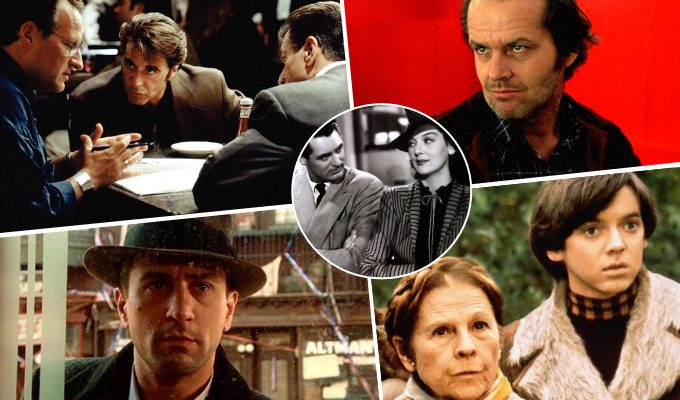 “The Lady From Shanghai” (1948)
“The Lady From Shanghai” (1948)
Aside from “Citizen Kane” (and even that only won one of its nine nominations) and four nods for the compromised “Magnificent Ambersons,” Orson Welles never had much luck with the Academy, and that started with “The Lady From Shanghai” — the exotic noir picture starring Rita Hayworth is now deemed one of the director’s best, but received mixed reviews at the time, and didn’t come within a sniff of an Oscar at any point.
“Letter From An Unknown Woman” (1948)
Max Ophüls’ melodrama, starring Joan Fontaine and Louis Jourdan (who passed away this past week), and based on a novella by “Grand Budapest Hotel” inspiration Stefan Zweig, remains wildly underrated today (it only hit home video in 2012). So it’s not exactly a shock to learn that it wasn’t appreciated in its own time either: despite being what you’d imagine to be firmly within the wheelhouse of the 1948 Academy, it was totally overlooked in favor of lesser pictures like “Hamlet,” “Johnny Belinda” and “The Snake Pit.”
“Local Hero” (1983)
“The British are coming,” announced “Chariots Of Fire” screenwriter Colin Welland at the 1982 Oscars when his film swept the board. But the reaction proved premature, if “Local Hero” is anything to go by. Bill Forsythe’s delicate Ealing-indebted comedy-drama about an oil executive (Peter Riegert) sent to a tiny Scottish island, which came from ‘Chariots’ producer David Puttnam, had rave reviews and seven BAFTA nominations, but didn’t appear to register on the Oscar radar, with “Amadeus” dominating instead.
“The Long Goodbye” (1973)
Let’s play a little game called “What’s Crazier?” Is it: Legendary Robert Altman was 0 for 5 in directing nominations? Or, Robert Altman wasn’t even nominated for “The Long Goodbye?” It’s a tricky one, because either way, shit’s crazy. The screen incarnation of gumshoe Philip Marlowe, as portrayed by Elliott Gould and guided by Altman’s energetic and organic camera, is easily one of the director’s best efforts, and Academy members completely ignored it. Madness.
“M” (1931)
Fritz Lang was never nominated for an Oscar, which is, in and of itself, an absurd thought (not even an Honorary Oscar? Come on!) Looking through his inestimable filmography, though, if we were forced to pick one that should’ve been a shoe-in for a win (let alone a nomination), it’s easily his most praised and popular, film noir anti-Fascist masterpiece “M.” Oscar was still an infant, which is the only legit excuse we can muster for this gargantuan omission.
 “A Matter Of Life And Death” (1946)
“A Matter Of Life And Death” (1946)
Despite their late-in-the-game adoption by Martin Scorsese, among others, Powell & Pressburger had mixed success with awards: Powell never won an Oscar, only “49th Parallel” and “The Red Shoes” were nominated, and many of their best films, including “A Canterbury Tale,” “I Know Where I’m Going!” and “The Life And Death Of Colonel Blimp” weren’t nominated for anything. But the most egregious snub is “A Matter Of Life & Death” — the pair’s wondrous, fantastical love letter to U.S./U.K. relations and one of the greatest films ever made.
“Mean Streets” (1973)
Before Martin Scorsese finally received that Oscar (for “The Departed,” in 2007), his never receiving one became a joke of giant proportions (“Three Six Mafia: one. Martin Scorsese: zero” Jon Stewart joked at the ceremony in 2006). Of course, his first nomination came in 1982 for “Raging Bull,” but we’d say it’s the one that made his name synonymous with the decadence of New York City that should’ve been his first, or at least that the movie should have been nominated for something, dammit.
“Miller’s Crossing” (1990)
Post “Fargo” and “No Country For Old Men,” the Coens are a real Oscar force, able to get even a difficult movie like “A Serious Man” a Best Picture nomination. But it took them a little while to crack the Academy’s radar (the Cannes-approved “Barton Fink” picking up their first notable nods), with the most disappointing snub probably being “Miller’s Crossing.” The period gangster tale is one of our absolute favorite Coen pictures, and should have been an easier sell, but nevertheless came up short.
“Modern Times” (1936)
It took AMPAS most of his life to recognize Charlie Chaplin, eventually granting the comic great an Honorary Award in 1972, after a previous one in 1929. They weren’t totally resistant to him: “The Great Dictator” got five nods, including Best Picture, but most of his work was ignored, most notably his great industrialization comedy, “Modern Times.” The film was mostly applauded, but the leftish politics on display (and unfashionable mostly silent vibe) saw it underperform in the U.S., and fail to get any Oscar recognition.

